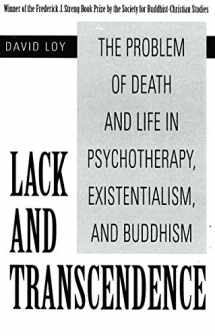
Lack and Transcendence: The Problem of Death and Life in Psychotherapy, Existentialism, and Buddhism
Book details
Summary
Description
Whatever the differences in their methods and goals, psychotherapy, existentialism, and Buddhism are concerned with the same fundamental issues of life and death and death-in-life. In this unique work, David Loy brings all three traditions together for the first time in a synthesis receptive to the insights of each, thereby casting fresh light on familiar problems.
Dr. Loy's work grew out of the cross-fertilization of two basic ideas: the psychotherapeutic concept of repression and the Buddhist doctrine of nonself. Buddhism implies that our primal repression is not fear of death but the quite valid suspicion that "I" am not real. This shift from libido-instinct to the way we understand our situation opens up new perspectives and possibilities which this book explores.
Written in a clear, jargon-free style that does not assume prior familiarity with the topics discussed, this insightful book will appeal to a variety of readers including psychotherapists, psychoanalysts, psychologists, scholars of religion—particularly of Buddhism—Continental philosophers, and literary and culture critics.


We would LOVE it if you could help us and other readers by reviewing the book
Book review



